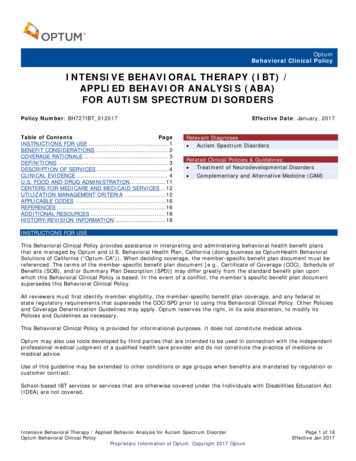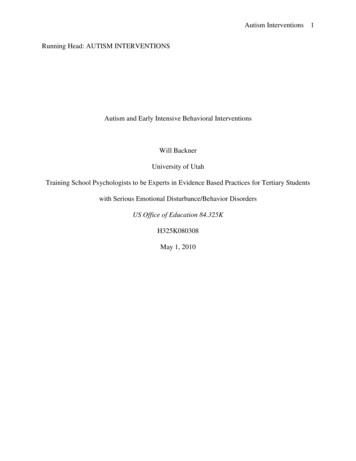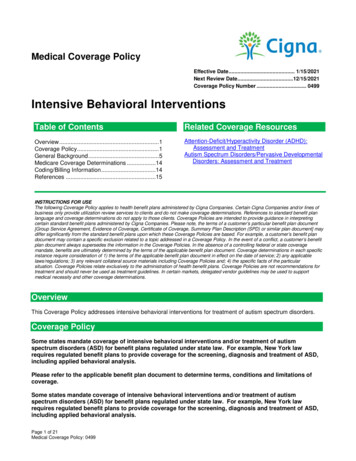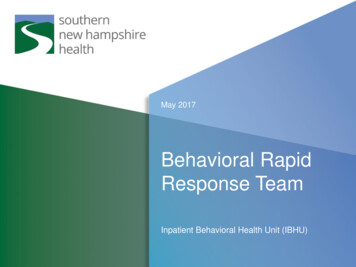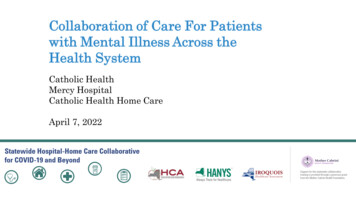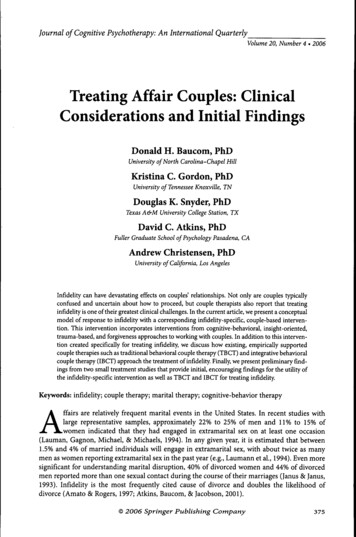
Transcription
Early & Intensive BehavioralInterventions for Children withASDWhat you need to know about ABA Therapy
What You’ll Learn What does ABA therapy looklike? What are the different kinds ofABA Therapy? Why is intensity and consistencykey for ABA Therapy? How collaboration &coordination helps What to do when you suspect achild of having ASD
What Does ABA Therapy Look Like?The Frequency of Sessions Year round, comprehensive,structured sessions designed toreduce maladaptive behaviors &teach new skills 4-7 days a week 1-2 sessions a day Sessions last a minimum of 2hours.
What Does ABA Therapy Look Like?Building The FoundationStep 1: ABA therapy starts withdetailed assessment of a child’sbehaviorStep 2: The BCBA develops anindividualized treatment planStep 3: The clinical team collectsextensive data while runningprograms outlined in thetreatment plan
What Does ABA Therapy Look Like?Ongoing Assessment Data is analyzed Needed changes areimplemented within thetreatment plan to maximizeeffectiveness.
What Does ABA Therapy Look Like?Who Provides Care?Overseen by:Board Certified Behavior Analysts(BCBA)Run By:Behavior Interventionists
What Does ABA Therapy Look Like?How Does a Session Start?A behavior interventionist oftenstarts a session with somethingknown as pairing.Pairing is designed to establish theBehavior Interventionist as areinforcer with the patient. Thisbuilds rapport and instructionalcontrol for the session.
What Does ABA Therapy Look Like?What Is Worked On?The child's current ability leveland goals will determine whichskills are practiced during an ABAtherapy Session.
What Does ABA Therapy Look Like?During a session, you may seeany of the following: Working at a table Interacting with toys or inactivities Running social programs Assisting in daily living skills
The Different Kinds Of ABA TherapyApplied Behavior Analysis (ABA):ABA therapy is the most frequently prescribedtreatment for Autism Spectrum Disorder (ASD.)Intensive ABA Therapy (30- 40 Hours per week)Focused ABA Therapy (15-30 Hours Per week)Center Based Care
Intensive ABA TherapyComprehensive ABA Therapy (30-40 HoursPer week)Targeted functional skills may include: Increasing Cognitive, communicative,social, emotional and adaptingfunctioning skills. Decreasing noncompliance, tantrums,repetitive/ ritualistic behaviors
Who Benefits From Intensive ABA Therapy? Children under 6 Children over 6 that havesignificant maladaptivebehaviors The community. Earlyintervention is clinically provento hep children reach theirgreatest potential. Children who have deficits acrossmultiple domains
Focused ABA TherapyFocused ABA Therapy (15-30 Hours Perweek)Targeted functional skills may include: Increasing safety skills followinginstructions, sleep routines, self careskills. Decreasing aggression, elopement,feeding, disorders, self injury.
Who Benefits From Focused ABA Therapy? Children over 6 Children have a need to increaseor decrease a few targetedbehaviors. The community. Targeted care forschool age children enables thebuilding of skillsets that areimportant for communityparticipation
About Center Based ABA Services Enhanced oversight andsupervision Thoughtfully constructed learningenvironment Individualized treatment planning Group learning opportunities Improved accessibility Decreased burden on families Reduced environmental distractionfor children receiving care
Who Benefits From Center Based ABAServices Children Prescribed both Focusedand Intensive ABAChildren receiving Center based ABATherapy see more improvements in IQ,social skill development, and overallprogress than receiving in hometherapy alone. FamiliesThe access to care is increased forfamilies unable to accommodate hometherapy sessions. All other stakeholdersCollaboration is improved throughcentralized location of providers
The Importance Of The Initial Pediatric VisitThe initial role of the physician:- Counsel and guide parentstowards the next steps- Refer to diagnosis- Prescribe CareThe gold Standard: ABA TherapyIs the most frequently prescribedtherapy for children with AutismSpectrum Disorder.
Why is Collaborative Care Important? Enhance specialized care Care isn’t compartmentalized Care coordination is no longerthe responsibility of the family The Intensity of treatment iscarried over across all modalitiesof care.
Who’s On The Collaborative Team? ABA Therapy ConsultantPsychologistPediatricianOccupational TherapistSpeech TherapistSchoolFamily MembersOther PartiesThe ABA Therapy consultant works with all otherparties to assure that everyone is workingtowards the same goals.
Benefits of Clinical Collaborations Collaboration supports the medical plan (sleep,diet, medical comorbidities, GI problems,medication management. ) Collaboration provides effective data to thephysician for prescriptive changes Collaboration encourages adherence by family tomedical protocols
The Importance of Early Intervention Early intervention is clinically proven to helpchildren with developmental delays developto their greatest potential Children that receive early intervention andintensive care at an early age see clinicallysignificant improvements in IQ Children that receive early intervention endup requiring fewer services as they age due tobecoming more independent.Resources:ScienceDirect. “The Effects of Age and Treatment Intensity on Behavioral Intervention Outcomes for Childrenwith Autism Spectrum Disorders,” D. Granpeesheh, et al. Research in Autism Spectrum Disorders. Volume 3,Issue 4, October–December 2009, Pages 10141022. S1750946709000658ScienceDirect. “Prediction of Treatment Outcomes and Longitudinal Analysis in Children with AutismUndergoing Intensive Behavioral Intervention.” J. Virués-Ortega, et al. International Journal of Clinical andHealth Psychology. Volume 13, Issue 2, May 2013, Pages 91100. S1697260013700127?via%3Dihub
Questions?
Thank You For Your Time!Have more questions? Contact us!Phone: 800-434-8923Email: info@abskids.comWebsite: abskids.com
Intensive ABA Therapy (30- 40 Hours per week) Focused ABA Therapy (15-30 Hours Per week) Center Based Care. . "Prediction of Treatment Outcomes and Longitudinal Analysis in Children with Autism Undergoing Intensive Behavioral Intervention." J. Virués-Ortega, et al. International Journal of Clinical and Health Psychology.
